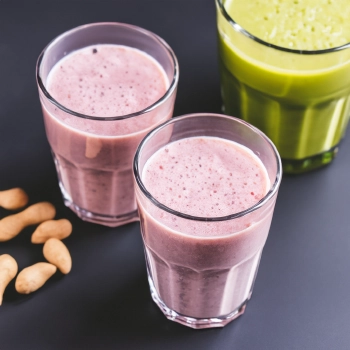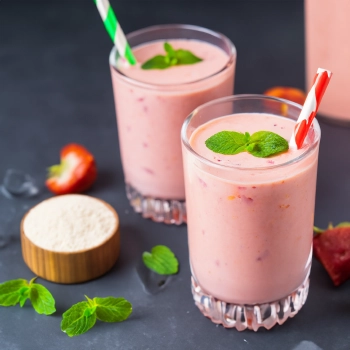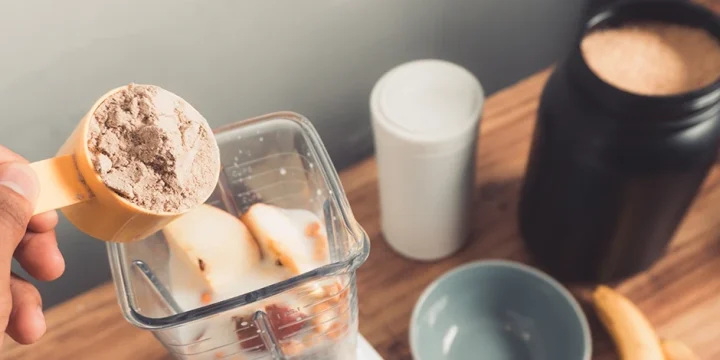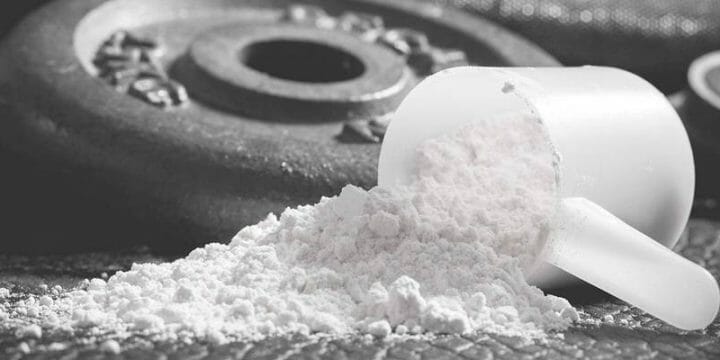There’s no denying how effective protein shakes are in helping people to bulk up.
However, what happens when you take them without working out?
As you may already have guessed, all those nutrients have to go somewhere. But where exactly do they go?
To answer this question, I’ve spent hours researching how these shakes affect the body to determine whether or not you should be worried.
Quick Summary
- Consuming protein shakes without working out is possible, but moderation is key to avoid excessive calorie intake and potential weight gain.
- While it's generally safe, drinking protein shakes without exercising can lead to side effects like weight gain and digestive issues, but it can also offer a mental upliftment and motivation.
- According to Frontiers in Nutrition, whey protein is highly efficient at muscle protein synthesis, a process vital for repairing muscles post-workout.
- In my view, while protein shakes can be a convenient nutritional supplement, relying on them without accompanying physical activity may counteract their intended health benefits.
Can I Drink Protein Shakes Without Working Out?

You can drink protein shakes on your rest days or without working out as long as you know your bodily needs. But if you don't exercise and protein shakes add a lot of calories to your diet, you might gain weight.
I remember when I first started my fitness journey, I was curious if I could enjoy protein shakes even on my off days. From my experience, it’s totally fine as long as you’re mindful of your overall caloric intake. I learned the hard way that not keeping an eye on those calories can lead to unexpected weight gain.
Athletes and bodybuilders leverage protein shakes to enhance their protein intake, facilitating muscle growth and workout efficiency. These shakes can also serve as meal replacements for effective weight management, offering a protein boost without overburdening the digestive system.
Drinking protein shakes without exercising can lead to side effects like digestive issues and weight gain. However, in many cases, excess protein is expelled by the body, mitigating some concerns.
While many discussions focus on the physical impacts of consuming protein shakes without a workout, it's equally crucial to explore the psychological effects. The mental upliftment, a sense of motivation, or even the placebo effect associated with regular protein intake can play a significant role in overall well-being, even in the absence of rigorous exercise.
What are the best protein powders?
Is It Safe To Take Whey Protein Without Working Out?

Moderate consumption of whey protein, even without working out, is generally safe. Derived from milk during cheese production, whey is a complete protein, rich in essential amino acids that support muscle growth.
This makes it highly efficient at muscle protein synthesis, a process where your bodily systems produce proteins to repair damaged muscles after workouts, according to the Frontiers in Nutrition [1].
According to scientific tests, “a group of researchers found that whey protein can facilitate muscle recovery and may hold particular relevance for athletes engaging in high-intensity, explosive sports.”
- Harry P. Cintineo, Human Performance Researcher
What Goes Into a Protein Shake?

In the varied landscape of protein shakes, the source of protein plays a pivotal role. Each type, be it whey, soy, pea, or others, carries distinct nutritional profiles and effects on the body. Understanding these nuances can offer tailored benefits, especially for those who prefer sipping on their protein shakes even on non-workout days.
A protein shake consists of a scoop of protein powder mixed with water or milk. Protein shakes are often created using a combination of protein powder, frozen fruit, ice, seeds and nuts, and liquid.
The amount of powder added depends on your weight. This is calculated at a ratio of 0.36 grams of protein per pound of body weight.
I love experimenting with my protein shakes, adding a variety of ingredients to keep things interesting. One of my go-to recipes includes a scoop of chocolate protein powder, almond milk, a handful of frozen berries, and a sprinkle of chia seeds. It’s not just tasty but also super filling!
For the enthusiasts who swear by their protein shakes, non-workout days need not be bland. There’s an art to customizing these shakes to align with the body’s reduced physical activity, ensuring that each sip offers balanced nutrition. From altering ingredients to adjusting portions, these tailored recipes promise both flavor and wellness.
Other common foods that are added to a shake include:
- Base liquid: This often consists of milk, water, or both. Milk is a good choice for extra proteins and to add richness to the shake.
- Protein powder: Popular choices include whey, casein, and plant proteins.
- Fruits: Bananas, strawberries, pineapple, mango, and blueberries are rich in vitamins and provide sweetness.
- Veggies: Greens like kale, spinach, chard, and lettuce add a ton of extra nutrients and minerals.
- Even more protein: In addition to powder, whole foods such as chicken breast, eggs, chocolate, seeds, yogurt, and fish can be added to the blended shake. Talk about protein overload!
How Do Protein Shakes Affect Your Body?

Protein shakes contribute to muscle growth, enhance performance, and aid recovery. They are also effective in preventing muscle loss, and can support muscle gain during weight loss efforts.
Increased Regeneration and Maintenance of Muscles
Proteins are responsible for the building and maintaining of muscle tissue.
Taking a shake as part of your diet helps repair damaged muscle fibers strained from working out. Over time, this increases muscle mass, strength, and size.
Consuming proteins along with intensive training in a workout will damage muscles further, leading to optimal results.
Healthy Fat Loss

Compared to carbs or fats, proteins are more satiating and help you feel content.
Taking a shake makes you feel full due to the volume of liquid in your stomach. This helps curb food cravings, reducing the intake of food you eat on your diet and minimizing your calories. Additionally, a shake can be used to replace a meal while still providing you with essential nutrients.
I used to struggle with mid-day cravings until I started incorporating protein shakes into my diet. Having a shake in the afternoon not only satisfies my hunger but also keeps those cravings at bay, making it easier to stick to my caloric goals.
Replacing meals with a shake can help you achieve your weight loss goals by eliminating excess calories and increasing metabolism. This is why people often use a shake as a meal replacement when they’re on a diet and want to lose a few pounds. They may even consume them in place of breakfast, lunch, dinner, or even alongside them, depending on their hunger level.
It is important to note that your body's protein demand per day will be low if you are not working out.
This means the more shakes you consume as part of your diet, the higher your calorie intake. If you consume too many shakes without exercise alongside your usual diet, it will lead to eventual fat gain due to increased calorie intake.
Lastly, excess protein needs to be excreted from the system as waste. Eating too much protein per day results in a lack of water, which overworks the kidneys. As a result, people at risk of kidney disease should be especially cautious about their protein intake.
FAQs
What Type of Protein Is Best For You?
Whey protein is the type of protein that is best for you if you want to build muscles or lose weight. It is quickly absorbed and broken down by bodily systems, allowing it to be utilized for muscle repair and growth after a workout.
Do Protein Shakes Make You Put On Weight?
Protein shakes may make you put on weight if you are not exercising. High-calorie drinks increase the number of calories going into your system. If you do not work out or put those calories to use, it gets stored in your fat cells and result in fat gains.
Can I Have Too Much Protein?
Yes, you can have too much protein. If you have a high-protein diet, you're at risk of developing kidney stones and other health issues. If you want the safest amount, consider taking no more than 125 grams per day, assuming you're a 140-pound person.
References:
- https://www.ncbi.nlm.nih.gov/pmc/articles/PMC6142015/
About The Author
You May Also Like







“Can I drink whey protein without working out?”– this is the question I’ve always wondered since I started taking supplements. I’ve never had a detailed answer. Thanks for this
So, what happens if you drink protein without working out? You get fat!